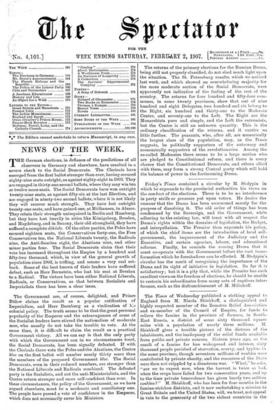he Government are, of course, delighted, and Prince Billow claims
the result as a popular ratification of Imperialism, and Herr Dernburg as a vindication of his colonial policy. The truth seems to be that the great personal popularity of the Emperor and the extravagances of some of the Socialist leaders have stirred the nationalism of moderate men, who usually do not take the trouble to vote. At the same time, k is difficult to claim the result as a practical Government victory. All we can say is; that the only party with which the Government can in no circumstances treat, the Social Democrats, has been signally defeated. If with the Clericals there vote the Poles and the Alsatians, the Centre bloc on the first ballot will number nearly thirty more than the members of the proposed Government bloc. The Social Democrats, even in their reduced numbers, are stronger than the National Liberals and Radicals combined. The defeated party is the Socialists, and not the anti-Ministerialists, and the Centre return stronger and more self-confident than ever. In these circumstances, the policy of the Government, as we have argued elsewhere, must be a moderate and conciliatory one. The people have passed a vote of confidence in the Emperor, which does not necessarily cover his Ministers.






































